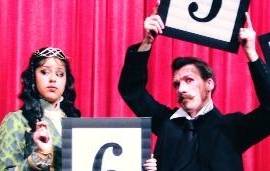I’ve been fortunate enough to cross paths with so many talented people in this town over the last few years. My personal foray into local theatre has led to connections with talented actors, singers, directors, and designers, people who are extraordinarily talented and derive incredible joy from creating art and entertaining an audience. Somewhere right up on the top end of that list of talented people in the C-U area is one Dallas Street, who has been acting, dancing, singing, and directing all over this area (and parts beyond) for years, spreading his love of live theatre and his incredible talent far and wide.
This week at Parkland College Theatre, Street will bring his directorial chops to bear on The Mystery of Edwin Drood, a truly unusual piece of musical theatre that must be seen to be believed. On the eve (the ides?) of the show’s opening, I chatted with both Street and Malia Andrus, who plays the titular Drood.
~~~~~~
Smile Politely: The Mystery of Edwin Drood isn’t an unknown show, but most folks probably don’t know the title and might be surprised at its origins. Could you give a little background?
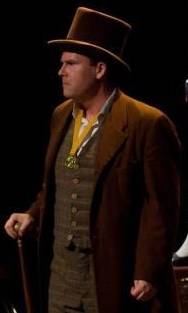 Dallas Street (pictured, right): Drood was Charles Dickens’ last novel. He self-published the chapters in installments, but unfortunately died halfway though his story. So we were left with a premise, intriguing suspects, but sadly, no resolution. In the early eighties, pop songwriter Rupert Holmes (“Escape– The Pina Colada Song”) was approached by N.Y. Public Theatre Producer Joe Papp’s office after one of his solo shows and asked if he’d ever thought of writing a musical. As it happened, he had been toying with the idea of Drood since the seventies. Along with writing music, lyrics, and the book, he developed the angle that the show would be set in an English Musical Hall as a troupe of actors presents Dickens’ tale. When it would reach the point where Dickens wrote no more, the show’s various outcomes would be turned over to the audience to vote on. Papp was intrigued, the show was staged in Central Park at the Delacorte Theatre and then transferred to Broadway for a very healthy run. It won five Tony Awards, including Best Musical. Drood was also recently revived this season by the Roundabout Theatre Company at Studio 54.
Dallas Street (pictured, right): Drood was Charles Dickens’ last novel. He self-published the chapters in installments, but unfortunately died halfway though his story. So we were left with a premise, intriguing suspects, but sadly, no resolution. In the early eighties, pop songwriter Rupert Holmes (“Escape– The Pina Colada Song”) was approached by N.Y. Public Theatre Producer Joe Papp’s office after one of his solo shows and asked if he’d ever thought of writing a musical. As it happened, he had been toying with the idea of Drood since the seventies. Along with writing music, lyrics, and the book, he developed the angle that the show would be set in an English Musical Hall as a troupe of actors presents Dickens’ tale. When it would reach the point where Dickens wrote no more, the show’s various outcomes would be turned over to the audience to vote on. Papp was intrigued, the show was staged in Central Park at the Delacorte Theatre and then transferred to Broadway for a very healthy run. It won five Tony Awards, including Best Musical. Drood was also recently revived this season by the Roundabout Theatre Company at Studio 54.
SP: I know that it differs from director to director, but everyone has his/her reasons for choosing a particular show. What’s your connection to the piece? Have you seen it performed elsewhere?
Street: I first heard the cast recording in college and was immediately struck by the literary quality of the lyrics. Being a Sondheim fan, I’m drawn to show lyrics that require closer analysis. I also found the published script incredibly intriguing. Pages and pages at the back of all of the possible endings “If X is chosen as murderer, perform song X then skip to…” What a puzzle! I first saw Drood staged at SIU Carbondale in the early nineties as part of their summer theatre season. One of my friends was the rehearsal pianist, and we had been singing these songs gathered around his piano for years. That production was such great fun! I’m not normally a fan of actors breaking the fourth wall, but I found it irresistible.
Throughout the years, I always found myself gravitating back to the cast recording and thinking “What a great show, but so much trouble! Rehearsing all of those separate endings, expensive Victorian costumes, such specific types of actors with the vocal chops to do justice to the score etc. etc.” Then last year as we were putting together our season at Parkland, the title popped into my head again. I knew we had the talented local actors out there to pull it off and it also offered great roles for our students. I had recently worked with Aaron Kaplan (Music Director) on The Producers and I knew that he could put together a top-notch ensemble of musicians for the pit. So we crossed our fingers and went for it. I couldn’t be happier with the result. We have an amazing set by Bernard Wolff and absolutely gorgeous costumes by Gregory Duckett. We actually chose Drood before we knew there was a Broadway revival planned. Last December, I saw the revival in New York and ran into composer Rupert Holmes at the back of the theatre. I mentioned to him that I was directing a production and we chatted a bit about how it all came about and he gave us his blessing. He’s a very nice man, and the revival was outstanding. There’s nothing like having seats close to the stage and having Chita Rivera wink at you!
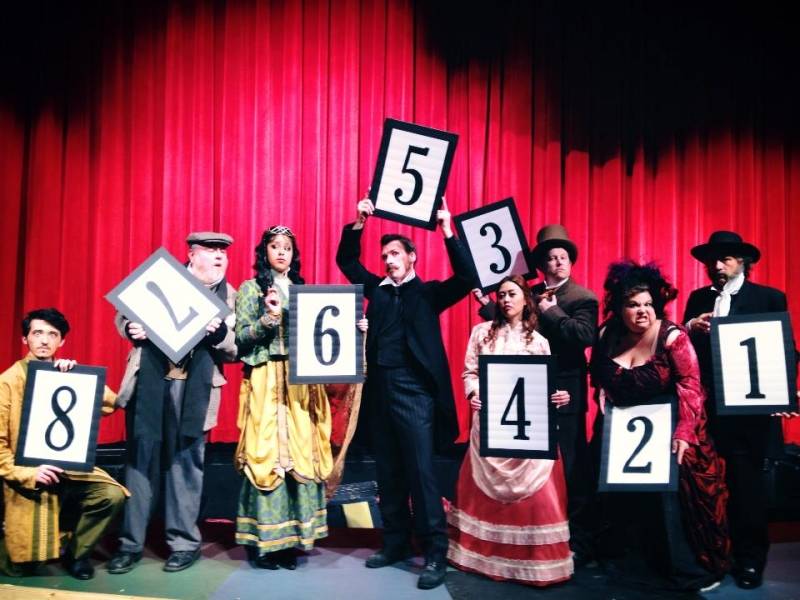
SP: This has been a really interesting season for Parkland. Some family-friendly comedy, some off-the-wall experimental stuff. What’s the audience for Drood? What is its appeal, in your opinion, to the community?
Street: I think Drood will appeal to folks who like a great deal of craft in their musicals. It’s a very ambitious show. It has an intriguing story, the play-within-a-play concept, period costumes, lively dances, creative scenery, a sixteen-piece orchestra playing a very intelligent and varied score performed by a very strong cast of singers and actors. But I think the real appeal is the carnival-like atmosphere of the secnd act where the audience votes on the possible outcomes. It’s all very unpredictable. They’ll vote on the real identity of the mysterious Detective Dick Datchery (the winning actor then assumes the role), the murderer of Edwin Drood, and then on a lighter note, the audience chooses two of the remaining characters to instantly fall in love and sing a love duet. There are 426 variations of endings. With only nine performances, the majority of endings will never be seen by our audience. It’s so unique and great fun!
SP: What are you most interested in/excited about the audience seeing or hearing? Any moment that still grabs you, as a director who has seen the show repeatedly?
Street: During this rehearsal process, I’ve gotten a huge kick out of watching the actors grow and experiment with these characters. Even though there are musical moments that still thrill me, like “The Name of Love– Moonfall Reprise,” I’m mostly excited to see how the actors deal with any unscheduled bits of business the audience may throw at them, or vice versa. My biggest joy comes from watching the cast up there having so much fun.
~~~~~~
Thank you, Dallas. And now, turning to the cast, I pose some questions to Malia Andrus, the talented singer and actress who will portray Edwin Drood him/herself (shimself?). I recently did a little show with Malia, so forgive the insider bit up front.
~~~~~~
Smile Politely: I like to start things off with a really stupid question sometimes. So … keeping busy?
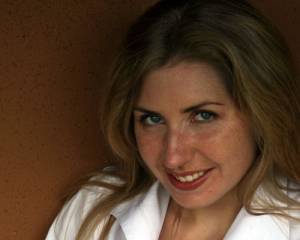 Malia Andrus (pictured, left): Oh man. This spring has been amongst the busiest times of my life. I generally split my time pretty evenly between costume design and performing, and this spring I designed and built two period plays (1930s — You Can’t Take It With You at Parkland, and 1660s — Or, at Station) before turning my full attention to Drood. Basically, once Drood rehearsals started, I was rehearsing weeknights for three to four hours, then coming home and sewing for two to three hours. For a few weeks on weekends I’d be putting in like 10–14 hour days constructing costumes. I’m also an engineer with a consulting firm, so I might be a little mad. But they were all such good artistic opportunities!
Malia Andrus (pictured, left): Oh man. This spring has been amongst the busiest times of my life. I generally split my time pretty evenly between costume design and performing, and this spring I designed and built two period plays (1930s — You Can’t Take It With You at Parkland, and 1660s — Or, at Station) before turning my full attention to Drood. Basically, once Drood rehearsals started, I was rehearsing weeknights for three to four hours, then coming home and sewing for two to three hours. For a few weeks on weekends I’d be putting in like 10–14 hour days constructing costumes. I’m also an engineer with a consulting firm, so I might be a little mad. But they were all such good artistic opportunities!
SP: Tell us a little about your character in Drood, if you would.
Andrus: Well, technically, I play an actress who plays two separate characters. Traditionally in English music hall shows, the young male protagonist (the “lead boy”) was played by a woman, in part to show off parts of a woman that wouldn’t usually be seen (like legs). Around the turn of the twentieth century, women like Vespa Tilley who specialized in these parts were household names. So my character, Alice Nutting, is one of these famous male-impersonating actresses. She has perhaps let that go to her head.
In the show within a show, Alice plays Edwin Drood, who is your typical young, upper-class Victorian literary hero: an orphan who is heir to his uncle, dutifully engaged to an old family friend, a bit snooty, especially to non-English folk, and surrounded by a cast of quirky characters. Alice also plays another mysterious character … but you’ll have to see the show to know what happens.
SP: Any particular challenges about this part, other than your hectic schedule?
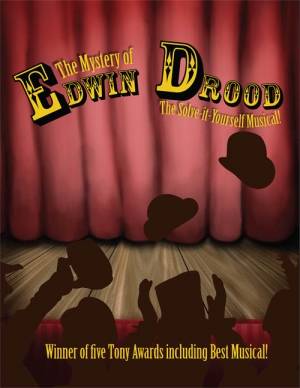 Andrus: It’s fascinating to play multiple genders in the same show, particularly as the music is clearly written for a female voice (as would be the music hall tradition). I feel like I might have some (extremely) small inkling of what my transgendered friends have experienced — it’s been interesting and sort of disorienting to be referred to as “him” in rehearsals, and to have to constantly consider whether I’m meant to be a boy or girl if Dallas says, ‘Okay, guys do this, and girls do this.’
Andrus: It’s fascinating to play multiple genders in the same show, particularly as the music is clearly written for a female voice (as would be the music hall tradition). I feel like I might have some (extremely) small inkling of what my transgendered friends have experienced — it’s been interesting and sort of disorienting to be referred to as “him” in rehearsals, and to have to constantly consider whether I’m meant to be a boy or girl if Dallas says, ‘Okay, guys do this, and girls do this.’
And on top of all that, and I have the huge shoes of Stephanie J. Block (who is singing the role on Broadway) to fill. No pressure.
SP: What would you say is the appeal of this show? It’s always tough to adequately market any play, but what would you say to people who don’t know the show?
Andrus: I’m a huge lover of mysteries. And of the Victorian period. And of Britain. And of challenging vocal music. So this has all of my faves in it. But for those people who are not me, this show is a lot of clever, entertaining fun. The music is insanely lush, with these crazy characters. But the big draw is that it’s got the same fun as those Choose Your Own Adventure stories we used to read as kids: the audience gets to choose multiple components of the ending every night. I think there are, like, 144 different possible endings, so it’s pretty much guaranteed that for our run of the show it will be different every night. Who wouldn’t love an interactive mystery musical that will be unique to your performance? Seriously.
~~~~~~
So there you have it. For lovers of musicals, lovers of mysteries, lovers of Choose Your Own Adventure novels, lovers of being winked at by Chita Rivera. Come one, come all; here is your show.
Performances are April 24–27 at 7:30 p.m.; May 2–4, at 7:30 p.m.; May 4 at 2 p.m.; and May 5 at 3 p.m. You can make your reservations right here.
Per Parkland’s website: While the Parkland Theatre considers The Mystery of Edwin Drood appropriate for mature kids and up, the story does contain some mild adult themes which were inherent in Dickens’ original story. Parents should email for details.








